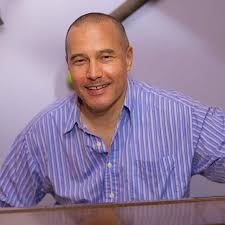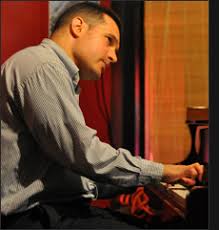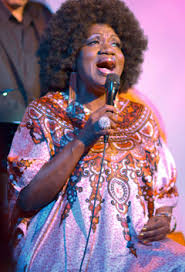| DMV-based pianist Chris Grasso has carved out a niche that certainly qualifies him for the pantheon of great jazz vocal piano accompanists. That admirable coterie includes a distinguished list of piano accompanists who were and are particularly adept at providing vocalists with the kind of pianistic care and feeding that is by equal turns comforting and challenging.
That list of great vocal pianist accompanists certainly includes artists like Bobby Tucker (Billie Holiday), Tommy Flanagan (Ella Fitzgerald), Norman Simmons, Jimmy Jones, Ronell Bright, Ellis Larkins, Jimmy Rowles, Lou Levy, Bill Charlap (Tony Bennett), and other notable vocal specialists. For the 2019 DC JazzFest – which now seems like a lifetime ago, what with pandemic restrictions in 2020 and our impending 9-month prohibitions of concert performances for audiences – we mounted an evening in tribute to Quincy Jones and Roy Hargrove. Opening that evening was the distinguished vocalist Sharon Clarke with the Chris Grasso Trio. That evening also featured an array of distinguished special guest soloists, including Cassandra Wilson, Joshua Redman and Kenny Garrett – each expertly accompanied by the Chris Grasso Trio, which added immeasurably to the great success of that Kennedy Center evening. Fortunately for the DMV community, Chris Grass has answered the pandemic era call for fresh musical performances with a series of live streams from Blue House Studio in Kensington, MD. Blue House, site of several of our virtual DC JazzFest 2020 performances last September, has proven itself a particularly adept space for streaming performances and Chris Grasso has seized that locale for his ongoing series. Next up for the series is Billie Holiday Competition winner Sara Jones with the Chris Grasso Trio on Friday, December 4. Clearly some questions were in order for Chris Grasso. When did you begin your Covid-era performance series at Blue House, and what was your original motivation? Our first performance was in March. It was actually a replacement for a live show. I had just started a new ticketed monthly series at Mr. Henry’s in February. Our first night, which featured Lena Seikaly, sold out. It was such a great audience – really a listening crowd, and not an empty seat in the house. Sharón Clark was the next featured performer, scheduled for March 20, and also sold out in advance. But the week before the show, the COVID shutdowns hit, and Mr. Henry’s had to close. I got in touch with Jeff Gruber at Blue House and we moved the show to his studio. Jeff and I have known each other and worked on projects over the years. I was really fortunate to know someone with his skills, and a beautiful studio, who was available and willing to help make it happen. Then, when we saw the response from the audience, it was pretty overwhelming.
How have you gone about publicizing these performances, and what has been the streaming audience response to these performances? Over the years, I’ve developed an e-mail list that’s grown to a decent size. Of course, social media is essential as well. I also try to get the shows listed on CapitalBop, JazzNearYou and other jazz listings and social media pages, including those done by Bertrand Uberall and Maryam Balbed. Promotion is definitely a big part of the work. Do you monetize these streaming performances? If not, how is this series supported? Yes, since the beginning, we’ve been requesting contributions from viewers, and that’s actually been successful. I think there’s something of a debate about the best way to handle streaming concerts. One school of thought is making payment mandatory – you send money, then you get a link to the show. I definitely understand that approach, and it’s obviously more like the way things would work in the analog world. The challenge with that is you miss part of the benefit of social media. Many people don’t plan or like to commit ahead of time, but if they’re scrolling through Facebook and see that a show is about to start, or even has already started, they may hop on and watch. Very often, they’ll also contribute. You’ve carved out a real niche for yourself as a sensitive vocal accompanist. Has that been your intention all along, or did other circumstances contribute to your excelling at that important role? I’d like to say that was by design, but it really was not. I’ve always loved great singers, but I didn’t really start to work with vocalists regularly until I began performing and booking the jazz at the Henley Park Hotel. We started the program with strictly instrumental groups, but it pretty quickly became apparent that the management wanted vocalists, so we switched the focus. Sharón Clark and Dick Smith became featured artists, and then we expanded to lots of other great singers, including Felicia Carter, Paige Wroble and more. Then, when I moved the program to the Mandarin Oriental, singers were really the draw, and that’s when I started working with Lena Seikaly, Sara Jones, Alison Crockett, Julian Hipkins and others. We also had a guest artist program where I got to bring in people like ThimNicki Parrott, Alan Harris, Denise Thimes, Denise King, Becky Kilgore, Byron Stripling, Annie Sellick and Deborah Brown. I was really lucky to get that opportunity. How has your Blue House series of streaming performances evolved thus far? Well, like everyone, we were really flying blind in the beginning. We had no idea whether people would tune in, and whether they would support it financially. After the first show in March, we realized there was a need for this kind of thing. But then, of course, lots of other streaming music started happening, so there’s a lot more competition. But, knock on wood, we seem to have developed something that people like and that, I hope, they’ll continue to support. What’s upcoming for your Blue House series, and do you view this as a temporary pursuit or have you extended your view towards this series being ongoing despite our collective desire to return to “live” performances before audiences? Our next show on Friday, December 4 features Sara Jones, a really wonderful vocalist who should be better known. Sharón Clark will be back in January, and I’m hoping to have Paige Wroble in for her first time in February. We had Dick Smith for a show over the summer, and I’d really like to have him back again if he’s up for it. I’d also love to start bringing people in from out of town if and when travel is a little easier. Do you view this kind of streaming “live” performance as a wave of the future, or is this purely a temporary response to the pandemic? There is nothing I would rather do than go back to performing live in a room packed full of people. I was really excited about the series at Mr. Henry’s because it was the first time I had the chance to do a recurring, ticketed performance series. As wonderful as they were, all the other regular venues I’ve done have been non-ticketed, and as everyone knows, that’s a crap shoot as far as audiences go. One night can be a dream, and the next night it can be dozens of drunk people yelling all night. That’s one thing you never have to deal with during a live stream, at least. I suspect live streaming will be with us for a while, but it’s so hard to say. But as long as it is, I’m going to try to make it the most satisfying musical experience I can, both for the audience and the musicians. |
Archives
- December 2025
- November 2025
- October 2025
- September 2025
- August 2025
- July 2025
- May 2025
- March 2025
- December 2024
- November 2024
- October 2024
- July 2024
- June 2024
- May 2024
- April 2024
- March 2024
- January 2024
- December 2023
- September 2023
- May 2023
- April 2023
- March 2023
- November 2022
- October 2022
- February 2022
- December 2021
- October 2021
- September 2021
- August 2021
- July 2021
- June 2021
- April 2021
- March 2021
- February 2021
- January 2021
- December 2020
- November 2020
- October 2020
- August 2020
- July 2020
- June 2020
- May 2020
- April 2020
- March 2020
- February 2020
- January 2020
- December 2019
- November 2019
- September 2019
- August 2019
- July 2019
- May 2019
- April 2019
- March 2019
- February 2019
- January 2019
- December 2018
- November 2018
- October 2018
- September 2018
- August 2018
- July 2018
- May 2018
- April 2018
- March 2018
- February 2018
- January 2018
- November 2017
- October 2017
- September 2017
- August 2017
- June 2017
- May 2017
- April 2017
- March 2017
- February 2017
- January 2017
- December 2016
- November 2016
- October 2016
- September 2016
- August 2016
- July 2016
- June 2016
- May 2016
- April 2016
- March 2016
- February 2016
- January 2016
- December 2015
- November 2015
- October 2015
- September 2015
- August 2015
- July 2015
- June 2015
- May 2015
- April 2015
- March 2015
- February 2015
- January 2015
- December 2014
- November 2014
- October 2014
- September 2014
- August 2014
- July 2014
- June 2014
- May 2014
- April 2014
- March 2014
- February 2014
- January 2014
- December 2013
- November 2013
- October 2013
- September 2013
- August 2013
- July 2013
- June 2013
- May 2013
- April 2013
- March 2013
- February 2013
- January 2013
- December 2012
- November 2012
- October 2012
- September 2012
- August 2012
- July 2012
- June 2012
- May 2012
- April 2012
- March 2012
- February 2012
- January 2012
- December 2011
- November 2011
- October 2011
- September 2011
- August 2011
- July 2011
- June 2011
- May 2011
- April 2011
- March 2011
- February 2011
- January 2011
- December 2010
- November 2010
- October 2010
- September 2010
- August 2010
- July 2010
- June 2010
- May 2010
- April 2010
- March 2010
- February 2010
- January 2010
- December 2009
- November 2009
- October 2009
- September 2009
- August 2009
- July 2009
- June 2009
- May 2009
- April 2009
- March 2009
- February 2009
- January 2009
- December 2008
- November 2008
- October 2008
- August 2008
- July 2008
- June 2008
- May 2008
- April 2008
- March 2008
- February 2008
- January 2008
- December 2007
- November 2007
- July 2007
Categories
- Ain't But a Few of Us (2)
- Artist's P.O.V. (32)
- Book Review (4)
- CD REVIEWS (1)
- Crate Digging (5)
- Events (2)
- General Discussion (541)
- Indy Record Company P.O.V. (4)
- Jazz Ed (2)
- NEA Jazz Masters (1)
- Playlists (27)
- Radio (3)
- Records (25)
- Release (1)
- Songs (2)
- SoundViews (1)
- Tech Side (1)
- That's What They Heard (13)
- The Audience (3)
- The Presenter's P.O.V. (15)
- The Tip (8)
- Video (1)
- Weston Chronicles (2)
- Wondering Aloud (2)
Blogroll



